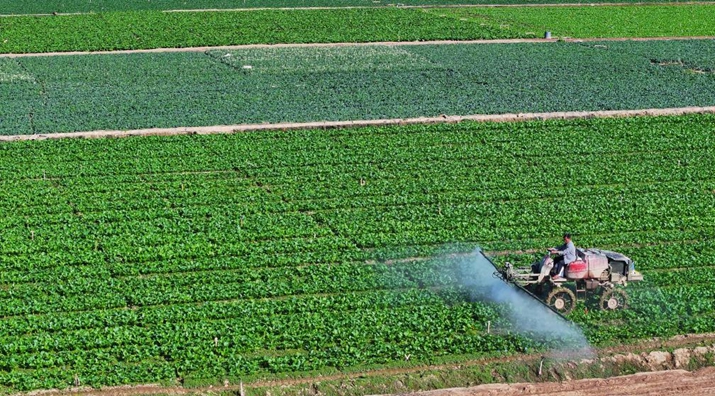| China |
| China's all-round efforts to drive agricultural development | |
|
|
 An aerial drone photo taken on September 23, 2024 shows a farmer fertilizing vegetables in Xiaoba Township, Qingtongxia City in northwest China's Ningxia Hui Autonomous Region (XINHUA) With the release of China's "No. 1 Central Document" for 2025, which outlines a series of enhanced measures aimed at advancing all-around rural revitalization, the country has reaffirmed its commitment to prioritizing and strengthening the agricultural sector. China remains committed to "opening a new chapter in advancing the development of agriculture, rural areas, and farmers," Han Wenxiu, the Executive Deputy Director of the Office of the Central Committee for Financial and Economic Affairs, told a press conference on September 24. It is poised to significantly boost agricultural efficiency, invigorate rural areas, and raise farmers' incomes by implementing targeted measures that address key priorities and pressing challenges, Han said. Enhancing food supply capacity Given the tight balance of overall grain supply and demand in China, "efforts to boost grain production must not be relaxed," Han said. He stressed improving the supply capacity of grain and other essential agricultural products and firmly ensuring food security. China will focus on increasing per-unit yields of grain by expanding projects aimed at improving these yields and intensifying the promotion of high-yield and efficient production models. China will also harness cutting-edge technologies to improve the efficiency and diversity of its food supply, leverage national land resources to expand food sources in multiple ways, and establish a long-term mechanism to prevent grain and food waste, according to Han. "Arable land is the foundation of ensuring food security," Han said. With less than 10 percent of the planet's arable land, China feeds one-fifth of the world's population. To consolidate the foundation of food security, China will also strengthen its protection efforts for arable land and improve its quality. This will be done through measures such as strictly maintaining the quantity of the land and regulating land use, according to the landmark document released on Sunday. Extending support for low-income groups, underdeveloped regions China's policy support will not stop after the conclusion of the five-year transition period dedicated to both consolidating and expanding achievements in poverty alleviation and integrating them with rural revitalization. Instead, the country will refine its support policies for low-income residents and underdeveloped areas, according to Han. Safeguarding the bottom line to prevent a large-scale lapse or relapse into poverty is not a task that belongs solely to 2025, the last year in the transition period, Han said. "The bottom line must be upheld persistently and permanently after the transition period." China will strengthen support for low-income rural populations by enhancing social assistance as a safety net and emphasizing the stimulation of the internal driving force within this population group, according to Han. For underdeveloped rural regions, the country will implement targeted policy support, with a key focus on promoting their revitalization and development. Differentiated assistance will be provided through mechanisms such as collaboration between eastern and western regions, as well as targeted assistance, enabling these regions to gradually catch up in the modernization process. Encouraging entrepreneurship in rural regions The key to rural revitalization lies in the talent, Han said, emphasizing that the talent pool needed to revitalize rural areas must be developed to address prominent issues in the process of China's modernization. The improvements in rural infrastructure over recent years, along with factors such as a favorable ecological environment, a slower pace of life and lower living costs have attracted college graduates and white-collar talent to develop new forms of businesses in rural areas, Han said. Currently, the number of people returning to or relocating to rural areas to start businesses in China has exceeded 12 million, according to data released at the press conference. The document outlines plans to improve the mechanisms for cultivating and developing rural talent, emphasizing a combination of local training and external recruitment. On the one hand, China will strengthen technical and skill training for farmers and advancing initiatives to cultivate rural artisans. On the other hand, it will create a favorable entrepreneurship environment and improve services at grassroot levels, attracting a group of urgently needed professionals to support rural development. "By addressing concerns such as career development and social security, we can ensure that young people not only stay in rural areas but also thrive and achieve greater success there," Han said. |
|
||||||||||||||||||||||||||||
|